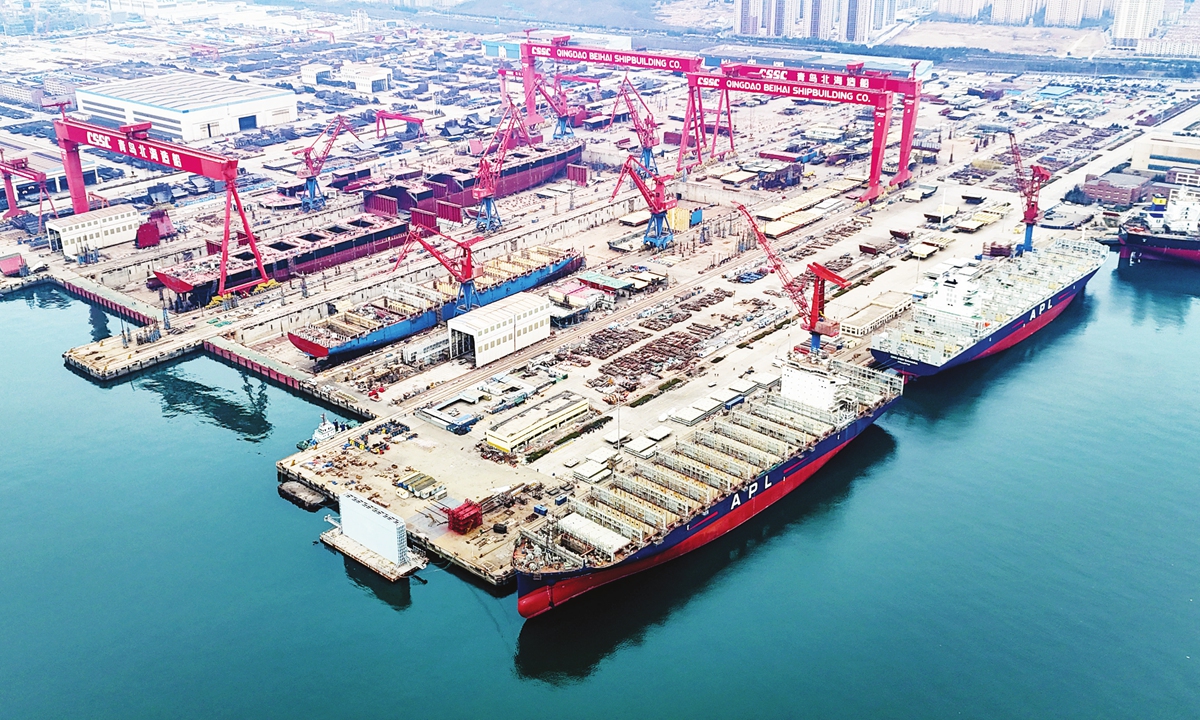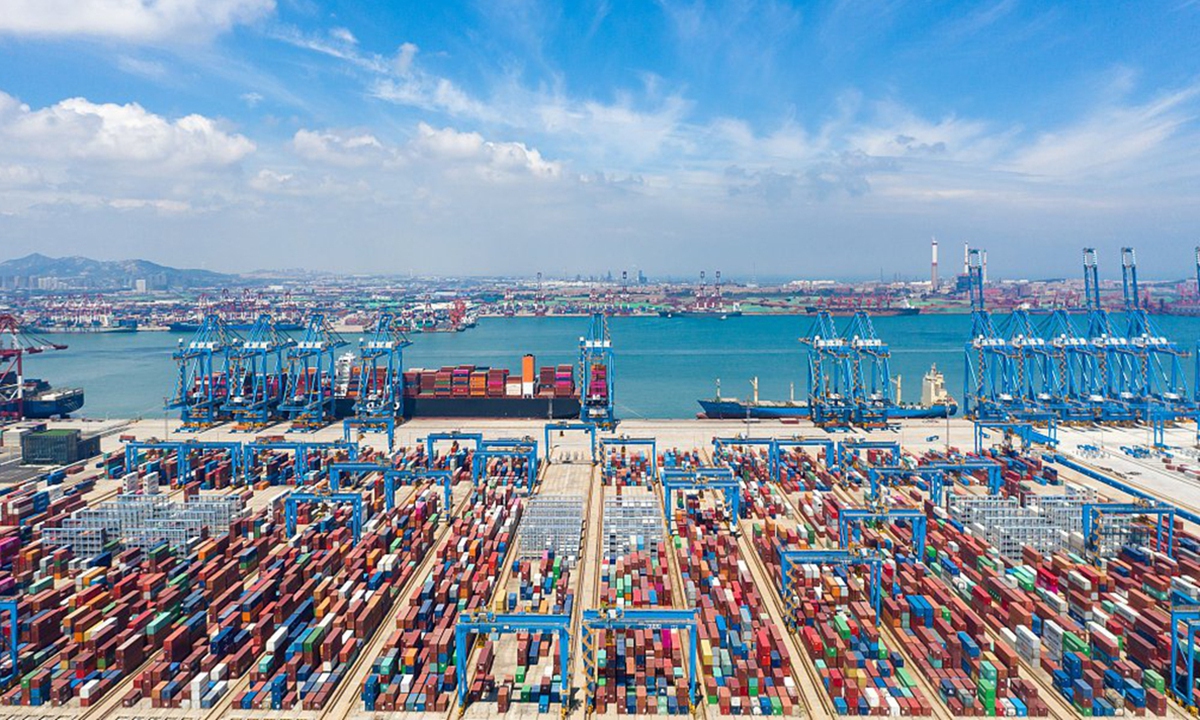China-US disputes affect business operation, as Washington’s ‘decoupling’ only harms economic ties: experts

Construction of multiple large vessels starts simultaneously at an offshore engineering industrial base in Qingdao, East China's Shandong Province on January 16, 2024. Photo: VCG
The disputes between China and the US resulted in certain negative impacts on the operation of enterprises from China, South Korea and Japan in 2023, according to a survey conducted among 275 senior executives from the three countries regarding their economic expectations for 2024.
Specifically, Chinese and South Korean companies have been majorly hit by the negative impacts of disputes between the world's two largest economies, per the survey jointly conducted by the Global Times Research Center, Maeil Business Newspaper, and the Nikkei in December 2023.
Experts called on the US to stop seeking to "decouple" from China, as political interference will only harm enterprises' normal operation and hurt economic ties.
US' 'decoupling' harms businesses
Some 61 percent of respondents from South Korea said that the disputes between China and the US had affected their operations negatively in 2023. Among them, 6 percent said that the negative impact had seriously affected their operations, while 55 percent believed that there were some negative impacts.
Meanwhile, 59 percent of surveyed Chinese senior executives saw negative impacts on their business operations, with 11 percent claiming that there were "seriously negative impacts" and 48 percent witnessing "some negative impacts."
The disputes did not significantly lead to negative impacts on the operation of Japanese enterprises, as 73 percent of respondents from Japan believed that there was no impact.
The concerns rising from Chinese and South Korean firms, especially from South Korean companies, came as multiple South Korean products involved in the trade with China have been affected by the US' "long-arm jurisdiction," Li Yong, a senior research fellow at the China Association of International Trade, told the Global Times on Tuesday.
Chinese and South Korean respondents also noted disputes between China and the US were a major factor that may lead to a potential deterioration of the business environment in 2024, according to the survey.
Based on feedback from Chinese respondents, the disputes ranked as the second most important likely cause of a worsening business environment in 2024, with 24 percent of surveyed interviewees nominating this factor.
Some 14 percent of South Korean respondents also nominated disputes between China and the US as a major trigger for the possible deterioration of the business environment, ranking the fifth among all chosen factors.
Li said that the concerns raised by the surveyed representatives reflected that politics has distorted business expectations. He noted that global businesses could make strategic decisions and take advantage of more opportunities with higher efficiency and returns without the political interference or distortion.
Each country would normally deploy the global market and industry chain based on their advantages with an efficient allocation of resources, and each industrial chain is able to gather most advanced resources worldwide to progress while countries can also enjoy dividends from their trade partners, Hu Qimu, deputy secretary-general of the digital-real economies integration Forum 50, told the Global Times on Tuesday.
However, US' artificial distortion and "decoupling" practices have resulted in disruptions throughout the global pricing system, which would add up the cost not only for the industrial chain, but also for the consumer end especially by implementing various subsidy and tariff policies, Hu said.
Li noted that the challenges still linger in the China-US relations, as the US will continue seeking to 'decouple' from China. He noted that the complementarity and advantages between the two countries will promote the efficient development of the global economy while offering effective solutions for current obstacles such as inflation.
The high level of bilateral trade and two-way investment deeply reflects the highly complementary economic structure of the two countries and their deep connection in the global industrial chain and supply chain. Artificial "decoupling" and blocking incurs more losses than gains, Chinese Foreign Minister Wang Yi said at a reception commemorating the 45th anniversary of the establishment of diplomatic relations between China and the US in Beijing on January 5, Xinhua News Agency reported.
Chinese firms optimistic on the economy
Another highlight of the survey results is that Chinese enterprises remained the most optimistic about China's economic situation and development in 2024, compared with how Japanese and South Korean interviewees responded to their own countries' economic progress.
When asked about their views on the current economic situation of China, Japan and South Korea, some 83 percent of Chinese respondents believed that China's economy was growing, with 33 percent seeing a rapid growth and 50 percent choosing "slow growth."
Meanwhile, some 70 percent of Japanese representatives said Japan's economy was growing slowly, and 19 percent of companies from South Korea were concerned about slow growth.
In term of expectations for 2024, 89 percent of Chinese enterprises believed that China would achieve a growth in 2024, with 38 percent seeing a rapid growth and 51 percent opting for "slow growth."
Some 81percent of Japanese respondents said Japan's economy would grow slowly and 35 percent of South Korean firms chose "slow growth" with respect to their expectations for the country's economic development in 2024.
Chinese respondents said that factors including firm policy support, actively bolstering domestic demand, technological progress, and the China-proposed Belt and Road Initiative would majorly contribute to China's economic development in 2024.
In addition to the above-mentioned factors, Hu expected more favorable conditions -
such as risks related to local debt - have been eliminated, with the fundamentals including the domestic demand remaining solid.
China is set to release its 2023 GDP figures on Wednesday, as the country's economy showed remarkable resilience in 2023 despite global pressures. Analysts have estimated that the GDP growth is likely to have exceeded 5 percent in 2023, and will continue to forge ahead in 2024 despite choppy waters.
Meanwhile, the China's continued efforts in promoting high-quality opening-up have continuously drawn global investors to ramp up deployment in China, including investors from Japan and South Korea.
Some 51 percent surveyed Japanese enterprises operating in China identified China as the "most important market" and "one of the three important markets" for 2024 and beyond, according to a separate survey by the Japanese Chamber of Commerce and Industry in China released on Monday.

Graphic: Xia Qing/GT

